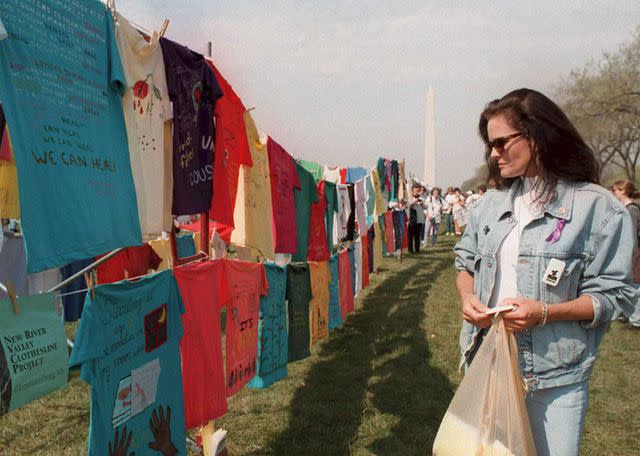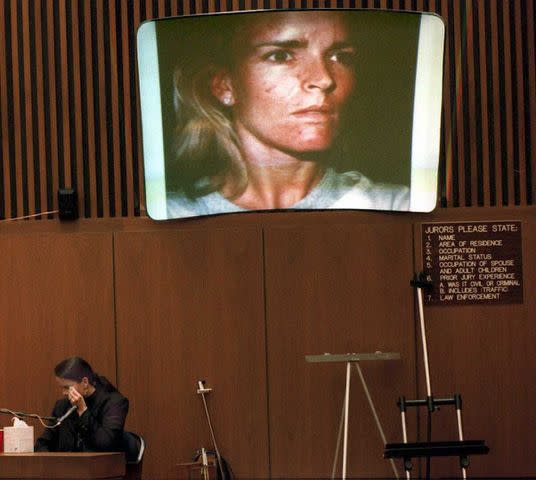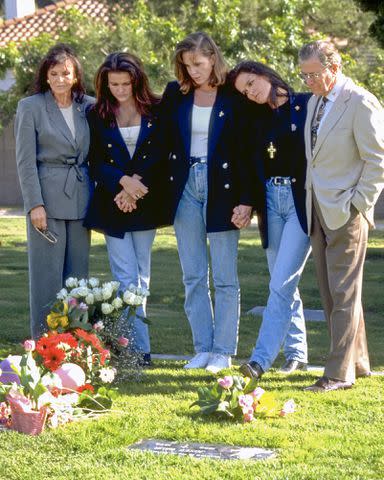How Nicole Brown Simpson’s Murder Raised Domestic Violence Awareness and Led to Lifesaving Laws That Protect Victims
- Oops!Something went wrong.Please try again later.
- Oops!Something went wrong.Please try again later.
- Oops!Something went wrong.Please try again later.
Nicole Brown Simpson's sisters spoke exclusively with PEOPLE ahead of the 30th anniversary of her June 12, 1994, killing

Ron Galella/Ron Galella Collection via Getty Images
Nicole Brown SimpsonOn June 12, 1994, Nicole Brown Simpson’s body lay in a pool of blood in the tiny courtyard of her Brentwood, California, townhouse, with her two young children asleep inside.
The world was shocked to learn about the brutal murder of former NFL star O.J. Simpson's ex-wife. But few knew about the years of abuse she had suffered at the hands of the once beloved football player who rose to further stardom because of his Hertz commercials and roles in The Naked Gun movies.
The beatings, constant put-downs and terror Nicole endured were made public during the so-called "The Trial of the Century, when O.J. was charged with murdering his ex-wife and her friend Ron Goldman, 25.
In 1995, O.J. was famously acquitted of killing them. In 1997, he was found liable for Nicole and Ron’s deaths at a civil trial, where he was ordered to pay a $33 million settlement to their families. He paid very little over the years. And when he died from cancer on April 10 at the age of 76, still maintaining his innocence, the amount he owed Goldman’s family totaled more than $114 million.
Nicole’s vicious murder rocked her family to the core, leaving a hole in their lives. But her death also led her family to bring national awareness to domestic violence, including helping to make sweeping changes to laws and improving the life for abuse victims across the nation.
Related: Justice For Nicole Brown Simpson — Read PEOPLE's Feb. 8, 2016 Cover Story
"Unfortunately, it took my sister, my sister's life, to pass the Violence Against Women Act," Nicole's sister Denise Brown, 66, tells PEOPLE. "And that was back in 1995.”

JOYCE NALTCHAYAN/AFP via Getty
Denise Brown hangs a shirt in memory of her sister Nicole Brown Simpson at the National Mall in Washington.To mark the 30th anniversary of Nicole’s murder, Denise and her sisters Dominique, 59, and Tanya, 54, open up about Nicole in the upcoming Lifetime documentary series titled The Life & Murder of Nicole Brown Simpson and open up to PEOPLE in this week's cover story.
Airing over two nights on June 1 and June 2, the documentary series features new details about Nicole’s life and death as well as never-before-seen footage of her.
For more on the life of Nicole Brown Simpson, as shared by her three sisters, subscribe now to PEOPLE, or pick up this week's issue, on newsstands Friday.
In 1992, Nicole filed for divorce, hoping to get away from her abusive husband, but the cycle of violence continued until her murder.
It was only after Nicole’s death that Denise and her sisters learned the disturbing extent about her life with O.J., though Denise admits she witnessed uncomfortable and terrifying moments along the way.
When Nicole was pregnant, “he was calling her a fat pig,” Denise recalls.
In 1989, Denise took pictures of Nicole’s bruised face — photographs that were later shown in court during the trial.

“I thought they were isolated incidents,” says Denise. “The next day Nicole would be back, like, ‘Oh, everything’s okay. We talked about it. It was my fault.'"
Denise says she and her family had no idea how to spot the signs of domestic abuse until after Nicole died. “Then you get educated on it. You see all the signs, you go, 'Oh my God.'"
Denise continues: “That's why I think education is so important when it comes to domestic violence, the power and control of one human being over another.”
Denise admits, for example, to “saying the wrong thing” to Nicole when questioned why she refused to leave O.J. after a particularly brutal attack.
“I said, ‘God, why are you with this a------? Why are you staying with him?’ Those are things you don't say to a victim of domestic violence," she says.

Roger Sandler
Nicole Brown Simpson's family at her gravesiteInstead, says Denise, "You listen to them because you don't want them to isolate themselves."
Denise and her sisters are heartened that Nicole leaves behind a legacy of helping other domestic violence victims.
“The Violence Against Women Act was passed, and that was due to Nicole's murder," she says. To make that happen, Denise says, “I went to Congress and I helped with the passing of the bill."
A year later, she says, the 24-Hour National Domestic Violence Hotline was formed. And then came the VINE system — Victim Information Notification Every Day — that alerts victims to changes in an inmate's status.
Says Denise, “I want people to know what her role was, the pain that she suffered, and what her role was after her murder, and what she has done to help other victims of domestic violence.”
If you are experiencing domestic violence, call the National Domestic Violence Hotline at 1-800-799-7233, or go to thehotline.org. All calls are toll-free and confidential. The hotline is available 24/7 in more than 170 languages.
The Life & Murder of Nicole Brown Simpson airs over two nights on June 1 and June 2 on Lifetime.
For more People news, make sure to sign up for our newsletter!
Read the original article on People.

